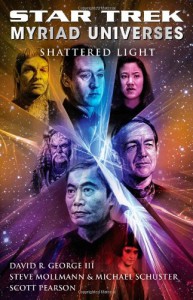Exploring the possibilities within the Star Trek universe

After finishing the first of the Star Trek "Myriad Universes" collection, Infinity's Prism (which I enjoyed immensely), I decided to read another in the series. While also a fun read, it wasn't quite as good, for reasons that I'll explain in my summary of the three novellas contained in this volume.
"The Embrace of the Cold Architects" by David R. George III — This story is based on a divergence in two episodes from the third season of Star Trek: The Next Generation: "The Offspring" and "The Best of Both Worlds, Part I" Data's daughter, Lal, survives her cascade failure and Picard dies in the Enterprise-C's encounter with the Borg. While the resulting developments are interesting, George just has too much going on in this to unpack within the space of a novella.
"The Tears of Eridanus" by Steve Mollmann and Michael Schuster — In the 23rd century Earth belongs to an Andorian-dominated "Interstellar Union," and Hikaru Sulu commands the Interstellar Guard's Kumari. When he learns that contact is lost with the observation post on Erdanus (also known as Vulcanis) where his daughter is stationed, Sulu orders his ship there to investigate.
This is the most interesting of the three stories in terms of its premise. It's divergence is a radical one — what if the Vulcans never embraced logic? This plays out on two levels: the consequences for the Vulcans and the shape of an Alpha Quadrant without their (and the Romulans') presence in it. There's a lot to like, but it doesn't gel quite as effectively as it might have.
"Honor in the Night" by Scott Pearson — Based on the classic Star Trek: The Original Series episode "The Trouble with Tribbles," a engine failure prevents the tribbles from interfering with the Klingons' plan to sabotage the Federation's effort to colonize Sherman's Planet. Yet from that disaster the officious Federation bureaucrat Nilz Baris builds a career that leads to the Federation presidency and peace with the Klingons, yet Baris's death leads to a reporter's investigation that may undo his life's work.
On this surface this seemed the most unpromising of the three. After all, just how good can a novella be that's built around a two-dimensional character from a single episode? Yet this proved my favorite, thanks to it's reimagining of subsequent Klingon-Federation relations (which is different but not too different from what fans of the franchise will remember), its sympathetic take on its central character, and the role played by the Klingons in the story. The great trinity of Klingon commanders from the original series — Koloth, Kor, and Kang — all make extended appearances, and there's a great twist at the end of the story that caps it all off nicely.
Overall this is a story that is well worth a Star Trek fan's time. Finishing it left me a little sad, as this was the final collection published and while the concept behind the series is a limited one I felt as though they hadn't quite exhausted some of the possibilities contained within it. I could even see myself reading novels spun out of the worlds the authors created for it, which is proof of the seemingly endless riches contained within the franchise.
 2
2






